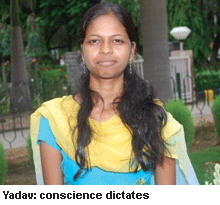Deepa Yadav, general secretary of the Delhi-based National Social Society (NSS), was recently felicitated at a public ceremony organised for the ‘Change Looms’ batch of 2008. Change Looms is a year-long programme that acknowledges and supports exceptional achievements of young people in the age group 17-27 years. A joint initiative of NGO Pravah and Ashoka: Innovators for the Public, supported by the Sir Ratan Tata Trust under its Youth and Civil Society Initiative and the Global Fund for Children, Change Looms honours young change-leaders involved in implementing unique social initiatives.
 Yadav’s public recognition as a Changeloomer is all the more remarkable given her humble origins. A resident of Kusumpur (near Vasant Vihar) Delhi, she lives in a makeshift structure with her father (a pan and cigarette vendor), her homemaker mother and four siblings. Enrolment in the National Open School system gave her the opportunity to self-study at her own pace, and she completed her class X CBSE exam in 2004. Currently she is enroled in a bachelor of social work study programme with the Indira Gandhi National Open University (IGNOU).
Yadav’s public recognition as a Changeloomer is all the more remarkable given her humble origins. A resident of Kusumpur (near Vasant Vihar) Delhi, she lives in a makeshift structure with her father (a pan and cigarette vendor), her homemaker mother and four siblings. Enrolment in the National Open School system gave her the opportunity to self-study at her own pace, and she completed her class X CBSE exam in 2004. Currently she is enroled in a bachelor of social work study programme with the Indira Gandhi National Open University (IGNOU).
The prime objective of NSS is to enrol school dropouts and non-literate children in Delhi into private and government schools such as Chinmaya Vidyalaya, Apeejay School, Kendriya Vidyalayas, Sarvodaya Schools and municipal schools. In higher education NSS aids, advises and assists youth to continue post-secondary education. Currently NSS has 20 school goers and 70 college students on its muster roll.
According to Yadav several judicial pronoun-cements have smoothed the path for children from low income groups to access education. “The Delhi high court’s ruling of 2008 has made it mandatory for all private schools built on Delhi Development Authority land to admit 20 percent of students from low income groups. However, that’s not enough. The lack of formal and informal education of children from poor families makes school managements reluctant to give them admission. In such situations NSS does necessary paperwork and exerts pressure on schools to admit underprivileged children as mandated by law,” says Yadav.
Inevitably she has encountered formidable obstacles in her quest to facilitate access of children from socio-economically backward families into mainstream schools. “When forsaking secure professions which offer stable incomes, social entrepreneurs have to contend with resistance from friends, family, teachers and the general public. But to change the world they must follow the dictates of their conscience,” says Yadav.
And society is better for it.
Kavita Charanji (Delhi)